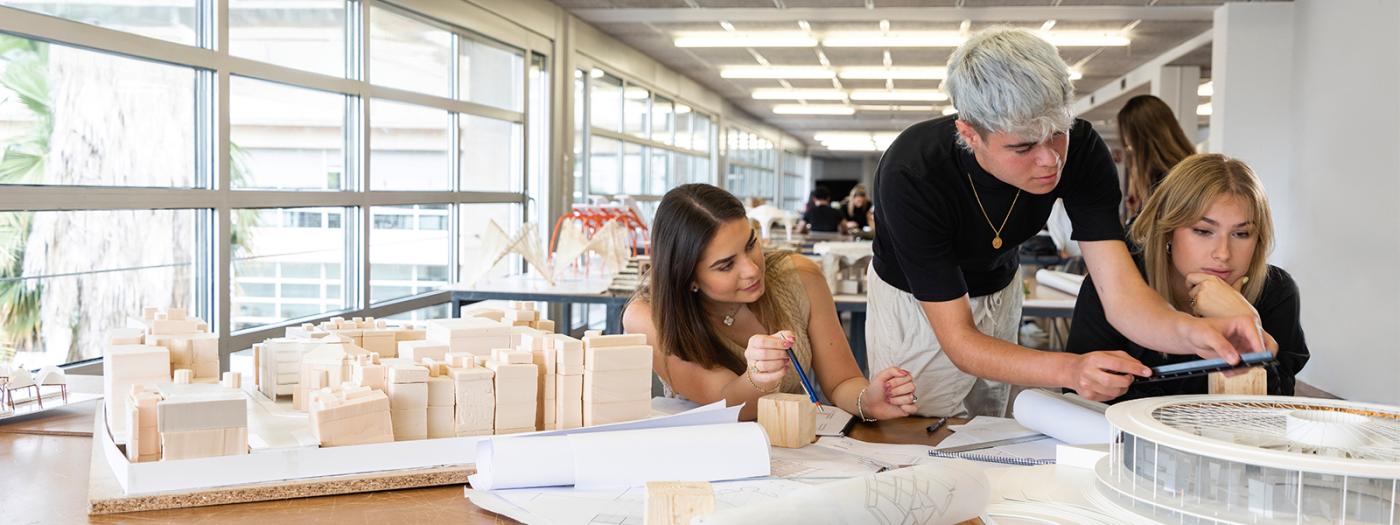Titular Professors
This subject introduces the student to the design process, placing special emphasis on the constructive principles. Diving deep into the parameters that define the tectonic project, relating them to the construction processes with the actors involved.
The Learning Outcomes of this subject are:
RA.01 Identifying and differentiating the agents that participate in the different areas of a construction project. From the design phase to the work execution environment.
RA.02 Identifying responsibilities and obligations of the agents involved in the architecture and building process.
RA.03 Recognizing the temporary and legal environments of the agents participating in the construction process.
The subject content is organized in two thematic units that will be worked-out interrelatedly throughout the course sessions. The tectonic design is the guiding and methodological thread that introduces the student into the knowledge of the construction process.
CONSTRUCTION PROCESS
Agents involved in the construction process: description and identification applied to the design project.
Scenarios of the construction process. Different building materials. Applications.
The Property: Private client vs Public developer.
TECTONIC PROJECT
Design based on the constructive principles. Meaning and definition of the Tectonic concept. Essential tectonic elements in architecture. Tectonic as an area of architecture that explores the expressive capacity of construction and its materials.
The methodology of this subject is project-based and essentially through practical learning by means of manipulating materials and hands-on building. The tectonic design and its consequent execution will be the methodological framework that will enter the student into the construction process.
The course includes four projects. The content will be introduced as needed for the development of the different exercises proposed in class and the final result will always be a physical object or a built construction.
All exercises will be presented with an introductory talk and will end with a group discussion of the results. The development of the task will be done in-class, in groups of 25 students/professor, and will be completed working after class.
P00_POSTCARDS. References
Observe and look for references that embody the concept and intention of the tectonic project.
By putting in common all images - the photographs of the student and the internet search references - we will explore the tectonic concept introduced in class.
P01_PAPER. Construction and poetics of paper
The tectonic concept will be attempted by using a single material -paper-. We will explore the relationship between its properties, the techniques used and their expressive capacity.
P02_ MODEL. Experimentation
The tectonic concept will be experimented focusing on the relationship between construction and its expressive potential.
We will be making physical models with different requirements as premises, using different materials and techniques.
Collective learning will be encouraged to generate a set of collective knowledge deliverables: the material submitted by the entire group will be used as knowledge to carry out the final project of the semester.
P03_INSTALLATION. Construction process and agents.
Exercise focused on the construction of a tectonic project. It will involve both the development of the design project and its final construction. Therefore, special attention will be paid to composition, aesthetics, construction principles and coherence of its materials.
Through a practical approach, the agents of the constructive process will be identified and explored.
The percentage of each exercise and the minimum mark required to average are as follows:
P00 POSCARDS: 5%
P01 PAPER: 10%, ≥ 4
P02 MODEL: 30%, ≥ 4
P03 INSTALLATIOIN: 50%, ≥ 4
TRANSARQ -Aula Barcelona-, Transversal activity: 5%
The minimum grade to pass the subject is a 5
The design exercises grades will be the result of a continuous assessment of the students work by their professor. In addition to the result, the grade considers also progression, participation, preparation and perseverance in the work. A minimum attendance of 80% will be required to pass the subject on this convocation.
In the event that standard evaluation is failed, students have the option to pass the subject on the retake convocation, The professor will indicate for each case which ones of the exercise must be redone or completed to achieve the minimum grade to pass the subject.
Kenneth F (1995) Studies in Tectonic Culture
Pallasmaa, J. (2020) Animales Arquitectos / (1995) Animal Architecture
Tanizaki, J. (1993) El elogio de la sombra / (1997) In praise of shadows
Specific bibliography will be provided with each presentation of the design exercises.
